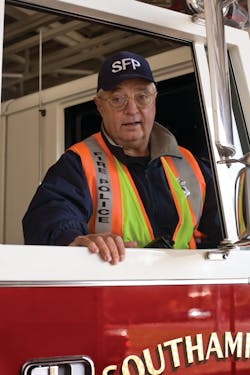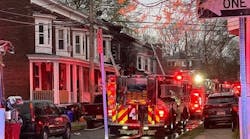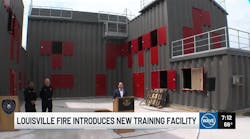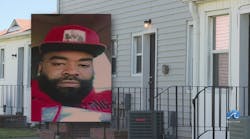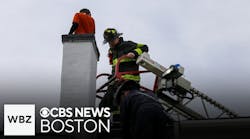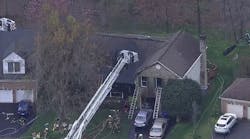In my sunset years, I opted to become a volunteer firefighter, the oldest rookie in the known history of the Southampton, NY, Fire Department, protecting greater Southampton, on Long Island’s East End, since 1881. At 68 years young, I whipped through the classroom stuff and survived the hands-on boot camp at the Fire Academy at Yaphank. A crisp certificate carrying the signature of the governor of New York qualifies me to enter a burning structure – prudently on hands and knees and burdened, like my brothers and occasional sisters, with 62 pounds of gear: the thick tan turnout coat and pants; those clumsy rough leather gloves; the helmet, facemask and air tank, right down to the heavy rubber boots with steel inserts in the soles.
But that’s not my job. With due allowance for aging knees and diminishing flexibility, I am fire police. Mainly, we control traffic at a fire or accident scene. Though I take the obligation most seriously (one year I answered 141 calls, albeit the vast majority trivial), I’m accustomed to describing the experience as something of a lark. By my bemused telling, I am an aging Don Quixote. Jocular or not, I do understand that the fire service holds life or death in its hands. A sobering thought.
It is Jan. 26, a frigid midwinter evening. I am standing in the intersection of Hillcrest Avenue and North Sea Road in Southampton Village. Half a block up Hillcrest, two dozen firefighters are trying to knock down a blazing fire in a modest house on the north side of the street, just down from the church. An 81-year-old man fell asleep with a lit cigarette in his hand.
That half block of Hillcrest is clogged with two fire engines and two hook-and-ladder trucks, the three fire chiefs’ SUVs, a couple of police cars and the Southampton Volunteer Ambulance. Lines of five-inch hose snake up the hill from the hydrant down at my corner. Three more trucks are parked along North Sea Road, having dispatched their crews to the front. From this distance I can see a couple of the hook-and-ladder guys dousing the building from above, working from the elevated aerial basket, probably pushing 400 or 500 gallons a minute. The fire, which began on the ground floor, whooshed up the staircase, a natural chimney.
As wet equipment freezes, the guys at the scene are fighting both flames and ice, as though nature has marshaled its most malevolent forces in unholy alliance. The sheer violence of that combination is enough to humble anyone. On this particular evening, we go to the mat with nature – and nature wins, exacting a mortal toll.
Our guys are in the front door quickly, groping through the smoke and the heat for the victim. (Later, three – Ted Duffey, Dean McNamara and Jason Poremba – will be commended for valor.) They find the old man on the floor, slumped against the kitchen door, overcome before he could get out. He’s not a slight load; eight or nine guys strain to hustle him out of the house and into the waiting ambulance. The ambulance tears off. The old man never revives.
Not knowing any better, I expect that our department would have experienced such a tragedy maybe every five or six years. Not so, the long-serving guys tell me later. They’ve pulled people out of burning buildings, they’ve seen death close hand in traffic accidents, but this loss of a human life to a blazing fire was the first in memory. Though Chief Joe Corr later applauds the search team’s work as a “good get” – they found and extracted the victim within minutes – the death was traumatic for the entire department.
My young friend Paul Mayo, part of the search team, also tells me later of groping around the ground floor, crawling, straining, unable to see in the smoke. For a brief time, there was a scary report that the man’s sister was also at home when the blaze erupted. On hands and knees, probing with a tool, Paul poked and prodded his way into nooks and crannies and corners and under beds. Paul, a new father, was making sure his search didn’t overlook a child.
Half a block away, I don’t learn that sad history until the next day.
With one notable exception, it’s my job to remain on the periphery of the fire scene, blocking streets, redirecting traffic, keeping it moving, protecting the fireground from intruders, well-meaning or not. (One midnight, we were nearly knocked down when a woman whipped her car around the corner and up Moses Lane to the fire. “That’s my house,” the woman cried as she stepped on the gas.)
The only time I get anywhere near a fire is when I help the interior guys change their air tanks. The firefighter stands passively, catching a short break, while we snap open a catch and twist, and twist, and twist, a little black knob to disconnect the air hose. Then we pop a spring release. Off with the empty tank; on with the new; reverse the process. Twisting that little knob takes forever. Done regularly, it makes for a strong wrist.
Ask a veteran, “What did you do in the war?” and he can tell you that, but little more. Thousands may have perished, but all he knows is the couple of hundred yards directly in front of his foxhole. More than a few times, I chafe at being distant from the real action at a fire. Later, I tell myself that’s how it is with any great cause. For every top dog in the spotlight, thousands of other citizens must serve humbly, their gift to their larger community.
What I mainly remember at one remove on that tragic evening when an old man died was the cold, the bitter cold, and the biting wind. At 10 o’clock, it was about 11 degrees. A northwest wind, 20 miles an hour, give or take, was gusting from Great Peconic Bay a couple of miles away, importing the chill all the way from arctic Canada.
Don Fanning, Dave Squirrell and I held that intersection for a bit less than an hour and a half. We halted traffic as the pumpers and trucks raced up North Sea and wheeled west up Hillcrest. We closed off Hillcrest with barricades and cones. Now, as we stand shivering, our burden has waned to waving gawkers on past and occasionally opening the barricades for some official vehicle to pass in or out.
I am encased in my lime-green reflective duty jacket with its thick black liner. I never stand stationary, bouncing about like a prizefighter in the ring. As much as I can, I face south along North Sea Road, so the back of my hood takes the brunt of the wind. For all that, I am chilled to the bone. I brought the wrong gloves; my fingers are numb. I can barely hold my flashlight, a yellow heavy-duty model with the lit orange tip, the most visible for directing traffic, day or night. My legs are OK, but my feet are frozen clumps. Up till now, we’ve had a mild winter, so I am still in running shoes on this frigid night in late January. After maybe an hour, some good Samaritan does a coffee-and-cocoa run to the 7-Eleven a long block away. The cocoa is wonderful. My fingers are so cold, I drop the precious cup after only a sip. The cup blows away, tumbling along North Sea Road toward the village.
My lieutenant, Jason Korte, yells, “Fred, take a break – go sit in the truck and get warm.” The first two times, I shake my head and grin gamely. What I lack in youth, I will make up in grit. The third time around, I can no longer stand it. The gutter is now slush from all that water runoff; trying to skip over, I soak only one shoe, only a bit. My eyes are tearing. When I reach the truck, my fingers won’t work the door handle. Once inside, I am bliss. The warmth caresses my cheeks; gloves off, my fingers begin to thaw and flex. I breathe easy again. But I am antsy, too antsy to shelter for more than five minutes, then it’s back on the street.
All the next day, I am groggy. Only then do I realize what a blow the cold had delivered. That hour and a half of exposure wracked me like a full-body concussion. As it happens, I am up early to take the 6:30 Jitney to Manhattan. On the way to the bus station, something impels me to go see the wound I experienced only from a distance. I veer my Jeep a couple of blocks out of my way and turn up Hillcrest, peering for the remains of all that action. In the pre-dawn darkness, it’s surprisingly hard to locate the right house. The first time, I drive past without recognizing a thing. Turning around, I finally pick out the place. The shell of the building still stands, like an empty carton. I see a security SUV in the driveway, nesting back in the shadows. I shiver at the sight of the charred, empty home where fire and smoke stole an old man’s life.
